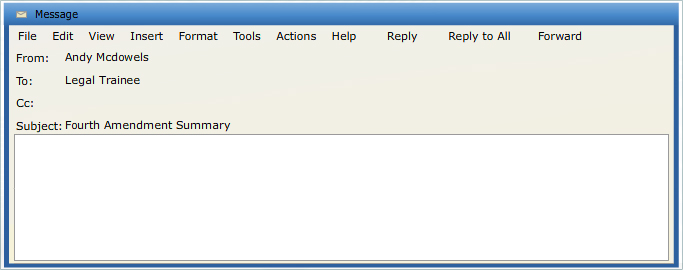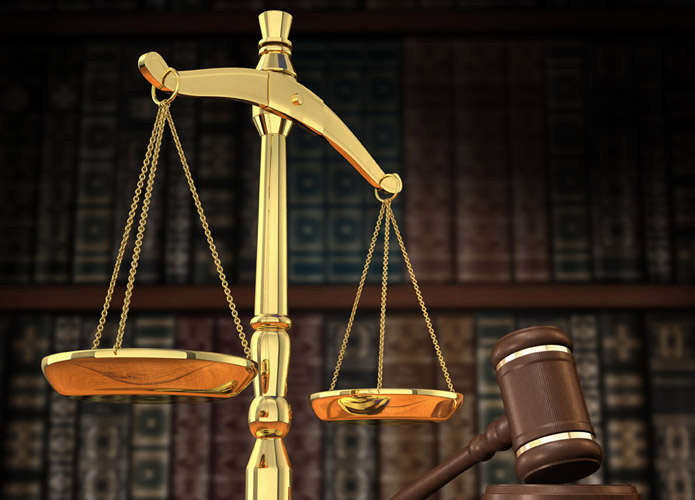Introduction to the American Legal System
Law has enduring presence in our lives. Do you agree with this statement? You will. Definitely. Our lives would have been in a mess without laws and orders in place.
As a legal trainee or a legal counsel, knowing about laws and orders will help you in making logical decisions. Let's review important information related to the American legal system. Think about the answers to the following questions and then click each question to reveal its answer. Next, click the ACTIVITY button to attempt a simple activity.
- What are the components of the American legal system?
- What are the types of laws based on evidence sources?
The American legal system has three components:
- Law enforcement
- Judicial system
- Penal system
There are three types of laws based on evidence sources:
- Common law: A judge gives a verdict by referring to decisions made in earlier cases. If cases are similar, the new case should reach a similar verdict.
- Code law: This is a written law adopted by the state and federal governments. Legal professionals are bounded by the terms of a written law.
- Constitutional law: This law defines the scope and application of constitution terms and is the final source of authority for issues involving U.S. federal laws.
Compliance
For an organization, compliance means following government rules, laws, and regulations and following its own established policies and procedures.
An organization needs to perform some steps for demonstrating compliance. Position the mouse pointer over each step for its description. Then, click the ACTIVITY button to attempt a scenario-based activity.
Step 1:
Create
Step 2:
Compare
Step 3:
Modify
Step 4:
Develop and
implement
Step 5:
Monitor
Step 1:
Create policies to comply with legal requirements.
Step 2:
Compare compliance requirements against the organization’s daily practices.
Step 3:
Modify the organization’s practices, if required.
Step 4:
Develop and implement monitoring systems to alert the organization if security measures required by the law are compromised.
Step 5:
Monitor employees’ performance and create training programs that educate them about compliance
requirements.
The Doctrine of Precedent
Can two stories have the same ending? Think about this.
The doctrine of precedent is one of the most important traditions in the American legal system. This doctrine means that judges will look at the verdict made in earlier cases to determine the verdict for a similar case. Let's take a closer look at the role of precedent in the American legal system by examining its benefits. Click each point to know about the benefits of precedent in the American legal system.
- Provides certainty
- Provides a growth opportunity
- Provides a practical approach
The doctrine of precedent gives certainty to judges if the case presented is similar to an earlier case.

The doctrine of precedent gives discretion to judges to make new rules or amend existing rules to fit with the changing values of society.

The doctrine of precedent is not derived from law theory or a model and does not consider any hypothetical cases. It is derived from actual cases presented in the court.

Difference Between Compliance and Audit
Compliance and audit are often associated with legal activities. Review the information given below. Then, click the ACTIVITY button to answer a simple question.
Compliance
Compliance means abiding by laws and rules. In addition, an organization should follow its own policies and procedures created by senior management.
Compliance is demonstrated on a daily basis through processes and procedures.
Audit
During audits, an auditor can review policies, laws, processes, and procedures to ensure that an organization is complying with the stated requirements.
Audits do not take place on a daily basis. In many organizations, audits are conducted annually.
Why Is the American Legal System Important?
Can you estimate the potential loss of money from a data breach? Maybe you can; however, it is difficult to interpret the exact amount. Millions are lost every year because of a data breach. Compliance with all laws and regulations allows an organization or an individual to enjoy all the benefits of free capitalistic society. Entrepreneurship has been the lifeblood of the American economy, and is totally dependent on justice and liberty guaranteed by the American legal system. Review the scenario given below to know how a data breach took place in Target Corporation.

Target Corporation was a third-party payment processor that gathered transactions from thousands of small- and medium-sized businesses and processed them in batches for major credit card providers, such as Visa and MasterCard. This made Target Corporation a perfect target for attack. Because of its high profile, Target Corporation was told that it had to comply with federal, state, and industry data security standards. In December 2013, Target Corporation (Target), the second-largest retailer in the United States, announced that it was a victim of a point-of-sale (PoS) data security cyberattack. The security breach occurred between November 27 and December 15, 2013, at the peak of the Christmas holiday shopping season. It's believed that private information (names, addresses, e-mail addresses, and so forth) of an estimated 70 million shoppers was compromised as a result of the breach. In addition, the attackers were able to secure debit and credit card information of 40 million customers. The credit and debit card breach included loss of PIN numbers and CVV codes. The Target breach is the second largest such data security breach in history. The record is held by the 2009 Heartland Payment Systems breach, which exposed 130 million credit and debit card holders. Click the RESOURCES icon to read the complete scenario.
I thought it would be a good idea if I discuss Jenny’s case with you over a cup of coffee. I have been handed over Jenny’s case yesterday, and I would need your help. Before going into details of this case, I wanted you to collect information on exceptions to the Fourth Amendment to the constitutional law.
You need to create a summary of your findings and submit it to me. I will send you an e-mail message that will detail out what all is required in your summary.
Contributing Factors
Two contributing factors will guide you to complete this assignment. Click each to get additional information related to the Fourth Amendment. After you have gone through the contributing factors, navigate to Course of Action from the panel at the top of your screen.

Read E-mail

Research the Internet
Select the icon from the top to receive additional
information related to the situation

Richard Dow
Project Manager
Well, I will answer all the three questions. First, if you really want to know about our primary mode of communication with the client, it is e-mail. At times, we do transfer confidential files by e-mail. For your second question, I will say that when the work pressure is high, we do take our work home using office assets, such as laptops, external hard drives, or CDs. I think most of the employees here do this. The response to your third question is yes. The logon details and system access of the former employees are still active.
Hi,
As already discussed with you, you need to create an executive summary on exceptions to the Fourth Amendment to the constitutional law. Before starting with the summary, ensure that you read about the Fourth Amendment and understand the nature and features of this amendment because they relate to privacy. This amendment safeguards against unreasonable searches and seizures. However, there are certain exceptions to it that have been established by precedence. For example, a search of the immediate surroundings as part of a valid arrest is an example of one of these exceptions.
With the understanding that there are established exceptions to the Fourth Amendment, you need to thoroughly review it and list the exceptions to it. Write a brief summary listing the exceptions and explaining why you think the listed exceptions are permissible.
The summary should look professional and substantiate the exceptions with an appropriate rationale.
All the best!
Kind regards,
Andy Mcdowels
Legal Counsel

Check the following links on the Internet to learn about the Fourth Amendment:
Course of Action
Use the following checklist as a guide to complete this assignment. Note that the tasks that you have completed are already checked in the list.




















